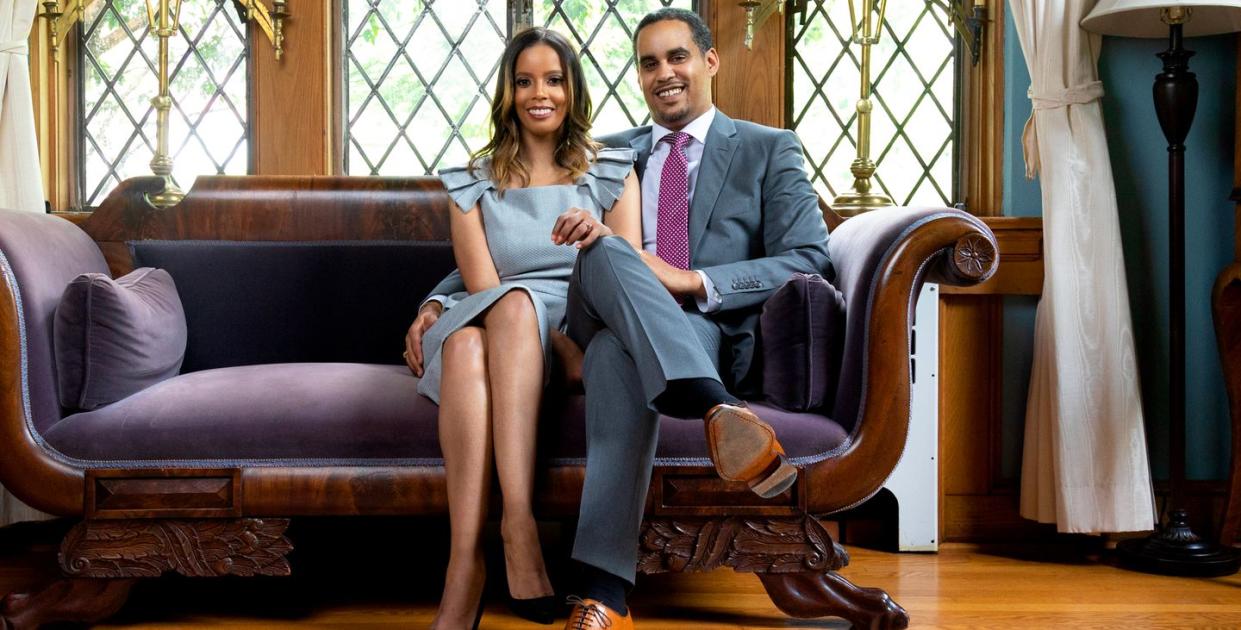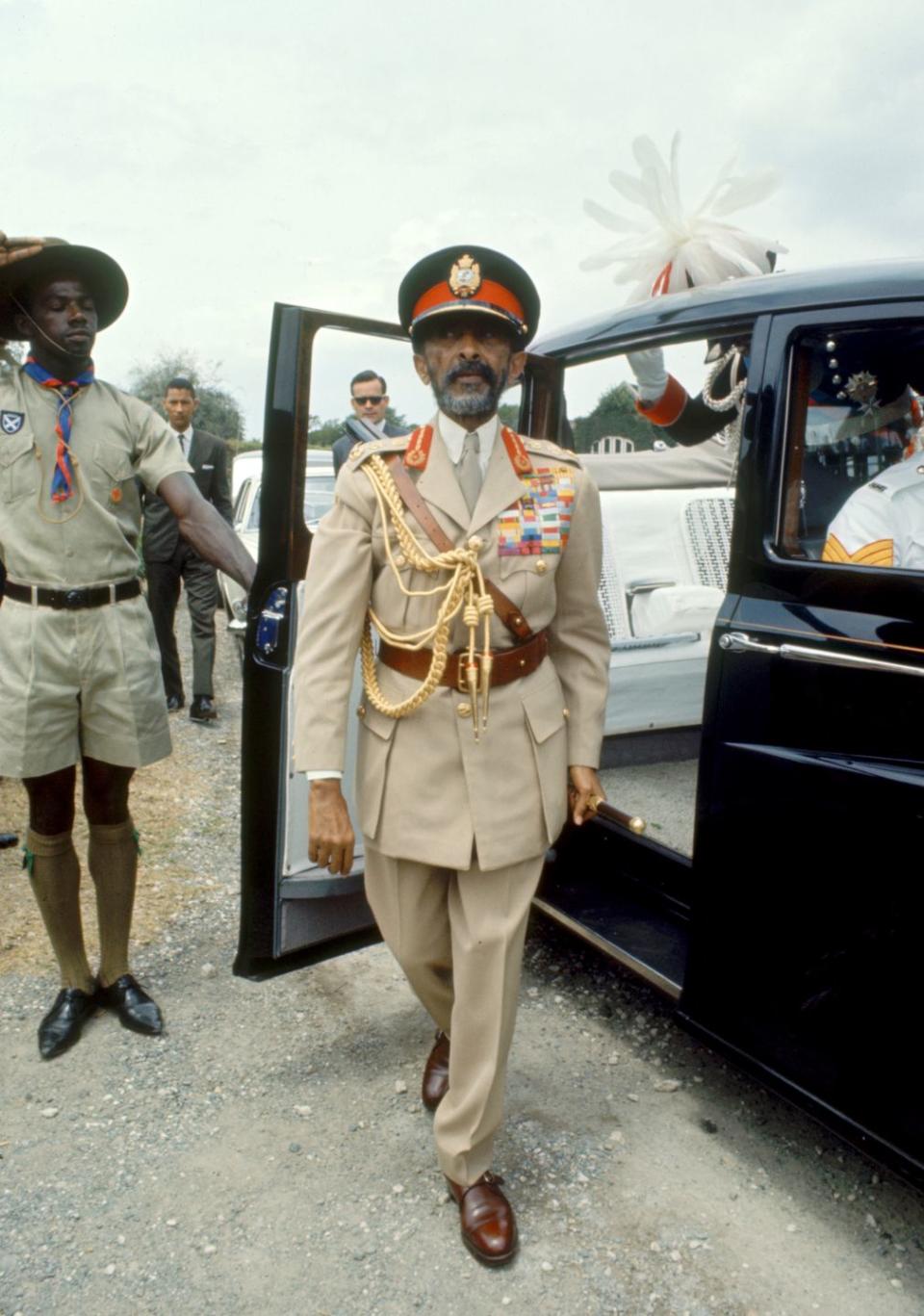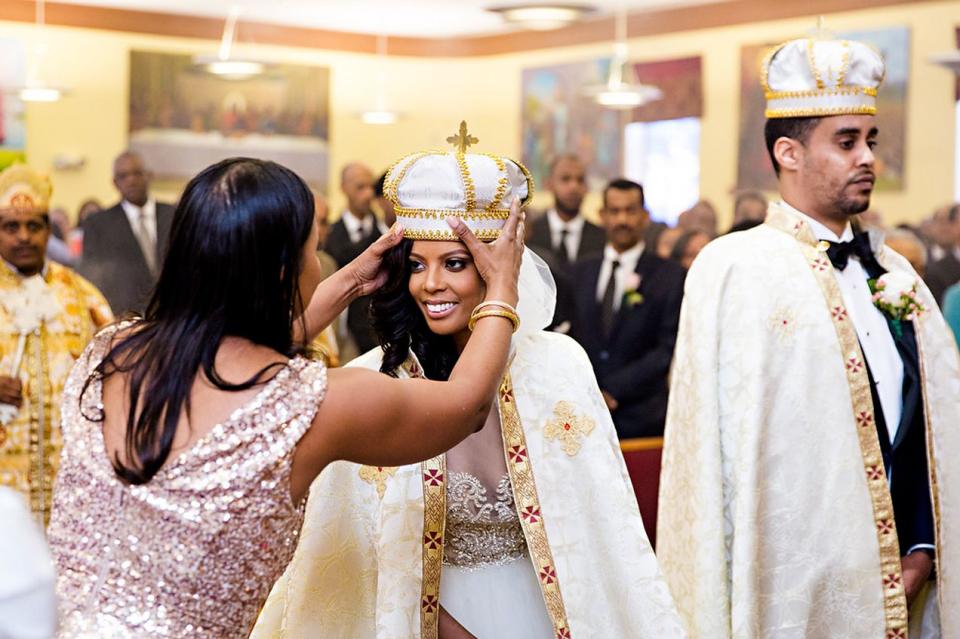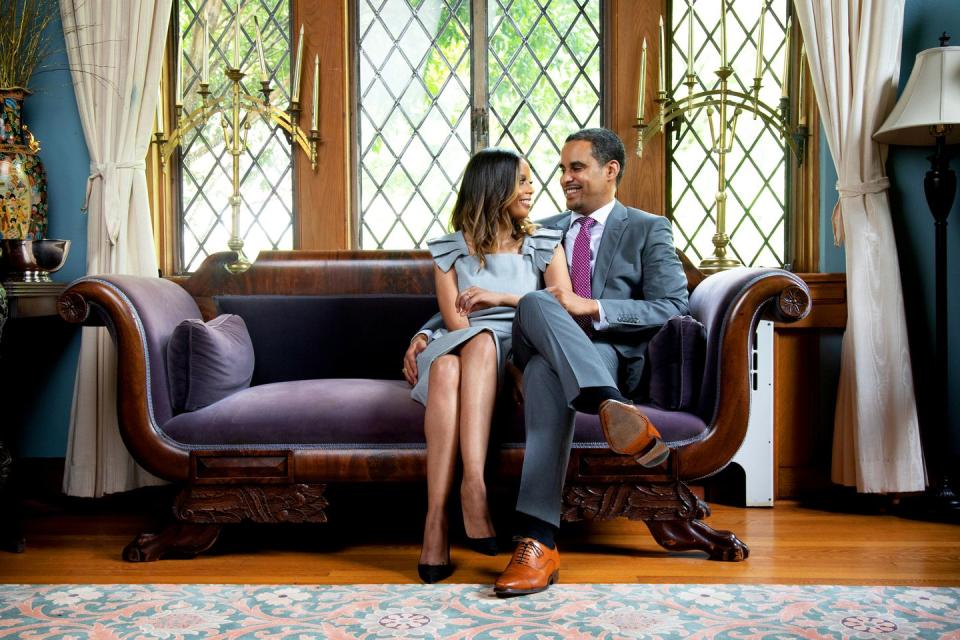An American Princess Opens Up About What It's Really Like to Marry Royalty

In the fall of 2005, when I was 21, I started a Ph.D. program in English. But within a couple of days, I’d realized that it wasn’t for me. I didn’t have a sure plan, but I knew this wasn’t a part of whatever the future held for me. Having recently completed college and just a year after traveling the world, I was brimming with confidence and feeling adventurous enough to take a big leap. I quit the program and headed home to my parents’ house in Washington, DC to figure things out.
Little did I know, that decision would not just change my career and my education, but the direction of my entire life. It led me to meet-and then marry-a prince.

I grew up in a close, ethnically mixed, fun-loving family with my two sisters and brother. My father is a writer, former sociology professor, and foundation executive from Kentucky, and my mother is an executive in the world of arts and humanities from Guyana.
We were steeped in the arts, passionate about education, and oriented toward service and social justice. We believed in offering the world more than you took, making it better than when you arrived. I knew I wanted to tell stories and I wanted to see-and change-the world. A husband and a family were never really something I dreamed of.
Once at home, I got a job in a clothing boutique. I wasn’t looking for love, but that December, on a brisk winter night, I met a guy at a chic downtown lounge. My friend and I had just gotten cocktails and were enjoying the music right by the bar. A man approached us and told my friend and me that we looked like a "Bombay Sapphire ad," a line that’s now famous in our families. He had this open, playful energy-and he was really handsome. We connected right away, talking easily and laughing.

He told me that his name was Joel and that he was finishing his last semester of college at American University, completing a double degree in international business-one part at his “home” college in Nice, France, and then this second portion in America. We talked for a few minutes and he said, with his charming smile, “You’re going to be my girlfriend.” I went right along with it, laughing. Later, on the dance floor, we had our first kiss. A few days after that, he called and asked me to dinner.
From that first encounter on the dance floor, we were instantly drawn together. He was so cosmopolitan, charming-born in Rome, he had attended boarding school in Switzerland, lived in Ethiopia, and was fluent in several languages. We talked about our families: He told me that his mother worked at the United Nations and that his father, who’d passed away, had been a pilot in the Ethiopian Imperial Air Force.
A Courtship Begins
A month after we met, Joel asked me to be his girlfriend. I’d never had a boyfriend, and those first couple months were fun, fast-paced, intense. He was tender and humble: he once admonished me for trying to kill a bug in a falafel shop. ”He’s not hurting you, let him live,” he said as he gently pushed the insect back to life. But he also talked about weighty things I’d never heard a young man discuss seriously-like revolution, especially the revolution in his own country, Ethiopia.

One night that spring, we were out with a group of his friends when one of them said something that began to reveal a side of Joel I didn’t yet know. He jokingly said, “You know you’re dating a prince, right?” I looked at Joel. He nodded and smiled. I reacted with a bit of shock and a bit of awe. “Really?” I said. Finally, he said “Yeah,” but not much more. I was definitely curious, but we didn’t discuss it further then, because he made it seem like not that big of a deal, and because I could tell he didn’t want to delve much deeper.
That summer, he returned to Nice after finishing his degree, and he invited me to visit for the month of August. It was a magical vacation: a road trip down the Southern coast of France, fresh fruit in the mornings, lots of Kanye West and French hip-hop, dance parties, beach nights.
We had an amazing time, but although we felt a deep connection, we split up for a while because our lives were taking us in different directions. After time spent in France and Ethiopia, he eventually did come back to America the following year and we picked up where we left off. A few months later, though, I decided it was time for me to finally live in Paris, like so many of my literary heroes. We broke up that year, but eventually both found ourselves back in DC, where we reunited and rekindled our relationship.

During that time, he revealed more about his family and background to me. He was honest, but not boastful; matter-of-fact, but generous with his knowledge. He was young, but he assumed a different kind of authority when he talked about who he was. As a person who loved history and a good story, I felt that Joel had the best narrative in the world: an ancient lineage, a legendary origin story, a dramatic 20th century, an abiding faith, and an ever-present sense of duty.
What Joel shared with me, bit by bit, was that he is a prince. And not just any prince, but a member of the oldest monarchy in the world, with a 3,000-year-old tradition descending from the biblical King Solomon and the Queen of Sheba. Even before I met Joel, I knew about his great-grandfather, Emperor Haile Selassie I of Ethiopia, the great King of Kings. Many West Indians-like my mother’s family-hold him in their greatest esteem; Rastafarians even consider him a deity.

More recently, in 1936, Haile Selassie was a Time magazine “Man of the Year” and, as founder of the African Union, he essentially brokered the critical relationships that organized a post-colonial Africa, uniting and ushering the continent into the modern age. He continued to rule, but toward the end of his reign was accused of being increasingly out of touch with domestic issues. Ultimately, in 1974, the monarchy was overthrown by a military coup that installed a communist regime. Many members of the royal family were killed or imprisoned.
In 1989, that regime was finally removed by the Ethiopian armed liberation movement, with assistance from the US, and a democratic federal republic was established, which is still in place today. All imprisoned members of the royal family were released and those outside the country were able to return to Ethiopia. Fortunately, most were given back their homes and other properties that had been confiscated. As sole heirs of their late father Prince David, Joel and his brother Prince Yokshan took back possession of the Wabe Shebelle hotel together with their father’s four brothers.
Over the years, the royal family slowly settled back in Ethiopia in a civilian capacity, but are in good terms with the current government led by Prime Minister Abiy Ahmed and President Sahle-Work Zewde. Today, the Crown Council of Ethiopia, the official body of the former Ethiopian Crown, hopes to reinstate a sovereign under a constitutional monarchy.

Learning about Joel’s heritage deepened my understanding of him, but most of the time, it didn’t change our day to day lives. I did get a glimpse of the “royal” side of him in 2010, when I went with him to attend his grandmother Princess Sara’s birthday party in a picturesque German castle (with the Von Badens, who are old, close friends of Joel’s family). She was received with such fanfare at their estate, it was a wondrous thing. I’m not sure if I knew until that moment the extent and the depth of the relationships the Ethiopian monarchy had with European royal families.
Joel and I loved each other, but the next few years took us in different directions. In 2012, Joel took a break from law school to work in Geneva and I got accepted to graduate school at Harvard. After I finished, I started a company, French Thomas, where I designed various cultural and educational projects in DC and New York City. By this time, Joel was back in DC full-time as a student at Howard Law School.
We finally found ourselves back in Washington having graduated, and we got engaged. It was time.
The Wedding
Our wedding itself was a week-long, high-energy celebration. Lots of dancing, good food, a coming together of old and new world traditions. I converted to Joel’s religion, Ethiopian Orthodox, in the weeks before. Finally, the wedding day arrived and the church doors opened to the sound of ancient hymns. Seated next to my husband, Orthodox crowns placed on our heads, oil grazed upon our foreheads in the sign of the cross, absorbing the rhythms of a persistent, hypnotic drum, I understood exactly why the faith was so important to Joel.

The idea of marrying a prince has certain connotations: castles, ball gowns, jewelry, wealth. That’s not what being part of a royal family means to Joel or to me. Our life certainly has wonderful, glamorous moments-like attending the Meridian Ball in DC, visits with European royal families, stays in the South of France, and extended visits to Addis Ababa, Ethiopia, at the hotel that Joel inherited. But the most important thing is the sense of duty to serve Ethiopia, to be an ambassador for the country’s rich history and culture.

Our wedding ceremony reminded me of how meaningful it is to be a part of something ancient and to be able to draw on that history to reimagine the world around you. I was humbled not only to join Joel’s family, but also to join their rich religious, political, and cultural traditions. In learning about the Ethiopian Orthodox Tewahedo Church, I learned more about Joel, his culture, and his family, their intertwined faith and rule. And finally, I could see myself as part of that tradition, and with Joel, I feel honored to share that legacy with the world.
Life With Joel
Today, we live in DC, where Joel works as an attorney and I work in philanthropy, helping foundations search for and support filmmakers, journalists, and content-creators. Joel has recently written and spoken candidly about his own story, growing up in exile, and the exciting recent developments in Ethiopian politics. He continues to support both conservation and youth entrepreneurship initiatives in Ethiopia. Together, we serve on the Global Leadership Council of the Meridian International Center’s, an organization which promotes a more stable, peaceful, and prosperous world through the exchange of people, ideas, and the arts.
As for me, I’m the patron of a fantastic organization, Arts and Resistance Through Education (ARTE), which engages young people to amplify their voices and organize for human rights change through the visual arts. And, I’m happy to be the Goodwill Ambassador for Friends of Guyana, which provides funding and support for cultural, health, environmental, and arts nonprofits there.
In honor of Joel’s remarkable heritage, we’re also pursuing our own storytelling projects, hoping to offer a fresh take on Africa and curating inspiring content for the diaspora and beyond. We have film and TV projects in development with our production company, appropriately named Old World/New World.

When it’s just Joel and me at home, we most often stay in-we love to cook or order takeout. We also entertain, whether that’s dinner parties or a recent high tea we hosted for two writers to support the work of the Hurston/Wright Foundation. We love to travel-last year we were in Napa, Jamaica, Ethiopia, and California.
On a recent night at home, after a weekend away in LA, we sat down together for a dinner of Ethiopian food: yellow lentils, red beets, chicken tibs served on a bed of injera. We watched a video that Joel’s cousin, whom we’d just been with, sent of her grandfather speaking just before Emperor Haile Selassie’s iconic appeal to the League of Nations. In it he expressed gratitude for the sympathetic public opinion garnered from the “new world and old world” to Ethiopia.
Every day with Joel, history like this greets you at the door. I once thought I might lose myself in a marriage, but instead life has opened up in ways I couldn’t have imagined. It’s clear that our greatest adventure has just begun.
('You Might Also Like',)

